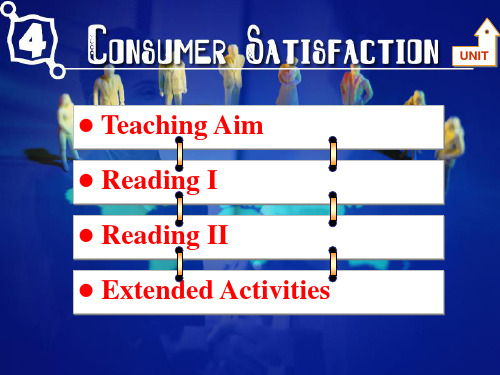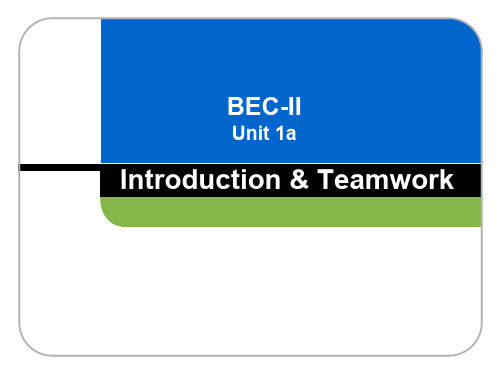商务英语精读说课
- 格式:ppt
- 大小:1.64 MB
- 文档页数:23


大学英语精读说课稿各位专家,各位老师大家好!今天我所说的课程是我院人文社科系高职商务英语专业的《大学英语精读》课程,大学英语精读(intensive reading)是大学英语中扩展英语词汇语法,提高英语阅读能力与写作能力的一种最佳方式,下面我将主要从以下四个部分说起(请看ppt)。
首先让我们来看一下第一部分教学大纲.一、教学大纲。
本部分共包括四项内容(一)制定依据:《大学英语精读》这门课程的教学应该说是建立在两个基石之上。
首先,它是一门英语专业课,它要遵循英语教学的规律与要求,融合传统与现代教学理念:强调打好扎实语言基本功,突出综合应用能力的提高。
同时,它又是在当前职业教育这个大背景下的一门课程,它又要彰显职业教育的特色。
当然,还要结合我院的实际情况。
以下这三个文件是我们制定大纲的主要依据。
(《高职高专英语课程教学基本要求》(2000年教育部出台的用于指导职业教育背景的英语教学)、16号文件(2006教育部推出的一项重要政策,对全面提高高等职业教育教学质量提出了指导方向)及我院的办学定位(培养德、智、体、美全面发展的高素质、高技能专门人才)(二)课程性质:本课程性质为郑州交通职业学院人文社科系商务英语专业高职学生专业必修课。
(三)课程定位:大学精读既是一门基础学科又是一门工具学科1. 基础中体现必要性,旨在帮助高职英语专业学生进一步打下扎实的语言基础。
基础中体现着重要性。
语法与词汇是高职英语主干课程的任务,只有基础打扎实了,才能服务于其它课程。
课时任务量每周8课时,训练时间相对宽松。
2. 工具学科要体现够用度即满足人文素质提高的基本要求我系学生专业课学习的一个辅助工具。
大学精读是学生中学英语学习与专业英语学习的一个巩固和衔接,这要求就要把学生中学时期遗留的问题一边解决一边转移的同时还要为高年级阶段开设的专业英语以及以后的学历提升做好铺垫。
工具学科需要特长培养和气氛带动,语言的精髓在于表达和交流,一个人的语言表达好坏展示一个人的精神和素质面貌。




《商务英语精读》课程教学大纲ENGLISH READINGS IN INTERNATIONAL BUSINESS课程代码:6550501学时数:总学时54(理论46 习题4 讨论4 )学分数:3课程类别:专业方向限定选修课开课学期:6适用专业:英语专业开课单位:外语系先修课程:商务英语BECII后续课程:商务英语翻译编写日期:2008年6月一、课程性质和目的课程性质:本课程是一门实用性很强的课程,以英语报刊中报道和论述国际商务的文章为主要内容,集英语语言学习和国际商务知识的传授为一体。
所选文章的主题、涉及的区域和文体有机结合,内容具有很强的时效性,涵盖当今国际经贸最重要的领域和国际商务的最新变化与发展;而语言则包含了商务英语中典型的常用短语和重要专业术语,以最典型和新鲜的商务英语传递最新的国际商务信息和当今热点。
目的:在学生现有的英语语言技能和相关经贸理论与实务知识的基础上,通过大量阅读,使他们掌握西方商务报刊文章的内容特点和语言特色,在阅读实践中培养并提高他们理解和研究国际经贸商务信息的能力,同时扩大和深化其语言和专业知识,增强语言运用能力和交流能力,并锻炼其逻辑思维能力。
一、课程教学内容、学时分配和课程教学基本要求课程教学基本要求:要求学生不仅要掌握课文中的语言现象和特点,还要能准确地理解文章的内容,简练地概括出文章的中心大意,并能就文章的内容进行讨论和阐述。
教学方法与手段建议:多媒体授课,课堂讲解、小组讨论和课堂练习有机结合,以国际商务文章的语言风格和特点,常用词汇、短语和句型以及文章的主要内容为学习重点,以提高学生语言理解和运用能力,锻炼其逻辑思维能力,并扩大其国际商务背景知识。
Chapter 1 China Builds Its NASDAQ教学内容及学时分配如下:1)背景知识介绍:NASDAQ 简介以及中国二版市场的发展,0.5学时;2)课文讲解,5.5学时;3)课后习题讲解, 0.5学时;4)课堂讨论,0.5学时。
课时计划任课班级:商务英语131 班教案编号: 1 周 1 号教学时间:2013 年月日Unit One Essentials of Business (1)ContentText: The Nature of BusinessDifficult Points1.Talk about some words, phrases or expressions about business;2.There are many new words in the text;3.Translate some difficult sentences of the text.Page 2: Warming-upWork with your group and think out as many words, phrases or expressions as possible about business.1) Are you interested in business? Why or not?2) What activities do you think can be labeled as business activities?3) Have you ever been involved in any business activities before?4) What do you think is important for success in today’s business world?(Teacher’s Book: Page 24)Good management, adequate planning, sufficient financial resources, healthy cash flow, controlled spending and the ability to collect money owing, effective marketing, a good product and service. Part Two: 15 minutesPage 5: New words No.1-17 to the first 6 paragraphs of the Text1. Divide the words in two groups: No.1-10; No.11-17;2. Lead the students to spell the words one by one;3. Repeat the words and play translating game;4. Mark the words in the three paragraphs and recognize them.Part Three: 30 minutesPage 2: Translate and understand the first 6 paragraphs of the Text1. Read the first 6 paragraphs silently and pay attention to the difficult points;2. Translate each sentence into Chinese and mark some language points:3. Review by reading each paragraph twice;4. Review by asking some questions: some from No. I, Page 81) What does “business” mean in the text?The key comes from Paragraph 1:It means the human activity related to material things. It’s necessary for civilization. And it is found in all societies, even the simplest ones. It’s the activity of producing and distributing goods and services.2) What are the four basic factors of production?The key comes from Paragraph 2:They are land, labor, capital, and entrepreneurship.3) What does the term “land” in this text refer?The key comes from Paragraph 3:Here, the term land is used most general way. It refers not only to a piece of real estate where we might build a factory, but it also means all the raw materials used for production.Some materials are on the earth’s surface, and some are under the surface. And some raw materials may be extracted from the air. All of the raw materials for production come from the land, the air, and the oceans.4) What does the term “labor” refer to in this passage?The key comes from Paragraph 4:It refers to the use of mental or physical work to produce goods. Most labor changes raw materials into finished products and then distributes these to buyers.5) What is the general meaning of “capital” in everyday language?The key comes from Paragraph 6:It means several things. The most general meaning is wealth or money.6)What does the term “capital” refer to according to this passage?The key comes from Paragraph 6:But it also refers to the equipment that money purchases. It’s all the things that workers use in production and distribution. It refers anything that helps to produce and distribute goods.5. Read the first 6 paragraphs together to review.Part Four: 10 minutesPage 6: New words No.18-32 to the rest 3 paragraphs of the Text1. Divide the words in two groups: No.18-28; No.29-32 with the 9 phrases;2. Lead the students to spell the words one by one;3. Repeat the words and play translating game;4. Mark the words in the paragraphs and recognize them.Part Five: 15 minutesPage 3: Translate and understand the rest three paragraphs of the Text1.Read the paragraphs silently one by one and know what are your difficult points;2.Translate each sentence into Chinese and mark some language points:3. Review by reading each paragraph twice:4. Review by asking some questions from No. 1, Page 8Questions:7)What is called entrepreneurship?The key comes from Paragraph 7:Putting together land, labor, and capital to make something of value, is called entrepreneurship8)What responsibilities should an entrepreneur take?The key comes from Paragraph 7:The entrepreneur is the person responsible for controlling and directing the other three factors. He is the leader, and the employees follow his direction.9)What kind of problems will a company cause to people when it goes bankrupt?The key comes from Paragraph 9:It means the company becomes unable to pay its debt, it causes problems for many people. It’s hard for the employees who have to seek work elsewhere; the customers must look for another place to buy the products; creditors usually lose some money to the company. But the entrepreneur takes the biggest risk if the business succeeds or fails. He must pay them up to the limit of his ability to pay.10) When will the entrepreneur make a profit and when will he suffer a loss?The key comes from Paragraph 9:If he is skillful and lucky, the money he receives from his business venture will pay for the land, labor, and capital and there will still be extra money remaining for him. This extra money is the profit. If the money he receives from the business venture is not enough to pay all of the costs, the difference is the loss.5. Read the rest 3 paragraphs together to review.课时计划任课班级:商务英语131 班教案编号: 1 周 2 号教学时间:2013 年月日Essentials of Business (2)I. Review the content of the passageII. Recite the passageIII. Explaining the language pointsrelate:relate something to something else 与……有关e.g. The report seeks to relate the rise in crime to an increase in unemployment.V+ ing as subject: The -ing form of the verb can be used as the subject of a sentencee.g. Seeing is believing.Taking good photos requires patience as well as keen eyes.Watching television at spare time is a good entertainment.辨析capital & money: Capital is the money or property that you use to start a business or to make more money. Money is what you earn by working and you use in order to buy things.e.g. The recycling industry is making huge capital investments in equipment.Do you have enough money to pay for the sandwiches?Therefore, collocations related with "capital" are: capital intensive industries(资本密集产业); venture/risk capital(风险资本); intellectual capital(智识资本). etc.Collocations related with "money", on the other hand. are: money bags(有钱人); Money makes a mare go.(有钱能使鬼推磨); money worshiper(金钱至上主义者).entrepreneurship:Entrepreneurship is a frequently used concept in English-speaking countries, but it is difficult to define and translate. It generally refers to a management concept characterized by development and renovation and the ability to implement this concept in marketing.(它指的是一种发展的、革新的经营观念,以及将这种观念贯彻在市场中的能力。
Unit 6 Management Learning Aims By the end of this unit, students should be able to: 1) know something about the management field; 2) learn how to make appointments in business situations; 3) master the key words or phrases related to management; 4) use suitable words and expressions to make an appointment; 5) consolidate the knowledge concerning verbs. Cultural Background Definition of management Cultural Background Management Process Cultural Background Staff involved in management * Chief Executive Officer (CEO) * Public Relations Managers * Vice President, Marketing * Sales Managers * Marketing Managers * Account executives * Promotions Managers * Creative Director * Media Director Reading 1: pre-reading activities 1. Brainstorming: Work with your partner and write out words or expressions about the titles of managing staff. Reading 1: pre-reading activities 2. Pairwork: Discuss the following questions with your partner: 1) Where do we suppose to find management? 2) What is the purpose of management? 3) What are the major functions of business management? 4) What do you think is a manager’s routine work? 5) What skills and abilities are desired for management work? 6) Who is the most suitable candidate for management work in your class? And why? Reading 1: text-based questions 1. How many types of managers are mentioned in the text? And what are they? 2. What is especially important for firms dealing in consumer products? 3. What are an information manager commonly responsible for? Reading 1: Structure Part 1 (para. 1) A brief introduction of the areas of management. Part 2 (para. 2-7 ) The responsibility of marketing managers, financial managers, operation managers, human resource managers and information managers. Reading 1: Language Points 1) Key words 2) Key phrases 3) Useful structures 4) Difficult Sentences Reading 1: key words survival n. [[]U]生存,活下来e.g. the survival of the fittest 适者生存His survival is still uncertain, for he has been very badly hurt and may die. survival n. [[]C] 生存者;残存物e.g. The old man is survival of a past age. This custom is a survival from my great-grandmother’s days. Reading 1: key words oversee v. 监督;监视;检查;视察e.g. The government agency oversees the airline industries. The supervisor oversees the quality of the newly manufactured products. Reading 1: key words recruit v. 招聘;征募;补充(特指为军队服务而征收新兵)e.g. Some students will be recruited as volunteers to teach in the remote areas this summer vacation. Jane was very glad to be recruited to serve in the army. recruit n. [[]C] 新兵,新成员e.g. We welcome new recruits. Recruitment n. 招募e.g. Theyfailed in their recruitment of qualified volunteers for the rebuilding of the city. Reading 1: key words implementation n. 执行e.g. Implementation of these proposals would have disastrous financial consequences. Reading 1: key words engage (in) v. 从事;预定;雇佣e.g. Mr. Smith has been engaged in politics all his life. I’ve engaged a room at the hotel. Mr. Black engaged a new secretary. Reading 1: key words process n. 步骤,方法v. 加工;处理in (the) process of 在……的过程,经过……e.g. The best solution can only be found by a process of trial and error. Adolescence is the process of going from childhood to maturity. The computer is in the process of repair. 28,000 applications for travel visas have still to be processed. Data is processed as it is received. Reading 1: key words afford v. 买(花)得起;负担得起;提供;给予 e.g. Many people cannot afford a car. Many smaller companies simply can not afford to buy health insurance for employees. Reading affords much pleasure for me. Reading 1: key phrases deal in sth. 经营,销售e.g. The police said that he was dealing in stolen goods. This is a small company that deals in rare art. deal with sth. 解决;处理e.g. The government must deal with the problem of high unemployment. I spent the whole morning dealing with my E-mail. Reading 1: key phrases put / place / lay emphasis on 重视;强调e.g. We should put emphasis on staff development. This English teacher always places emphasis on the importance of oral English. Reading 1: useful structures …so that + adverbial clause of purpose /result 以便;为了;结果e.g. The teacher must speak clearly so that his students can understand well. (adverbial clause of purpose ) The new dam controls the water of the Nile so that they now run regularly all through the year. (adverbial clause of result) Reading 1: useful structures see (to it) that + object clause 务必,确保e.g. See to it that you are here punctually tomorrow morning. See to it that you are not late again. I will see that it is done according to your direction. See (to it) that you get something to eat. See that the work is properly done. Reading 1: difficult sentences 1. For large financial institutions like Citicorp, Bank of America, and Merrill Lynch, effective financial management is the company’s reason for being. (para. 4) 2. In recent years, sound operations management practices have also become increasingly impo。